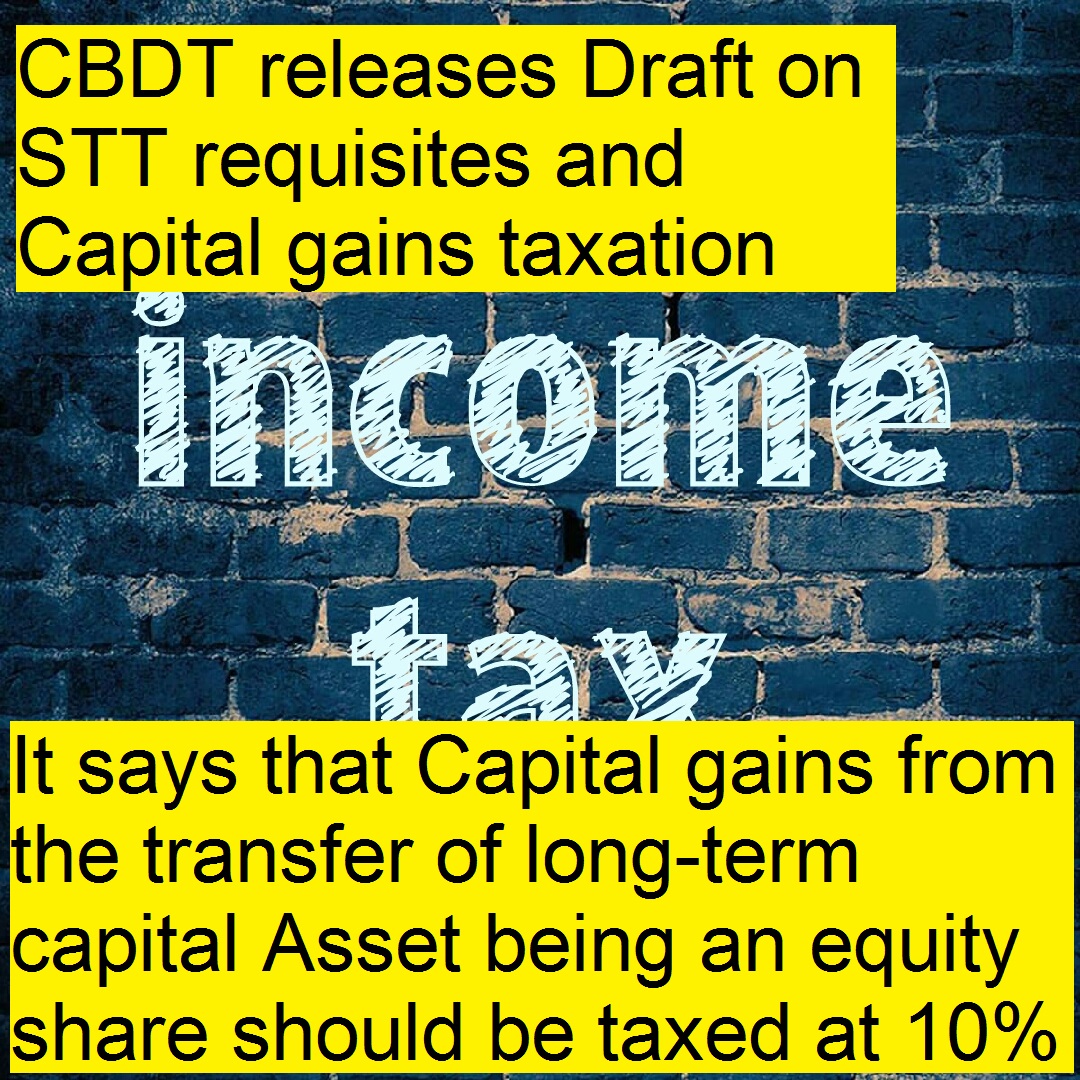CBDT on STT requisites and Capital gains taxation- Cases where STT not Applicable

Securities Transaction Tax (STT) is a direct tax which is levied on acquisition and transfer of securities listed on the recognized stock exchanges. It is an amount which is paid over and above the actual transaction amount and as such increase the transaction value. But now Government levy CBDT on STT requisites and Capital gains taxation.

CBDT on STT requisites and Capital gains taxation-Amendment in the Income Tax Act 1961
The Government has made the most significant Amendment in the Income Tax Act, 1961, by introducing the new provision, section 112A, under the Finance Act, 2018. It says that Capital gains arising from the transfer of long-term capital Asset being an equity share, units of a business trust or units of equity-oriented funds should be taxed at 10%. The said section can only be applied if securities transaction tax (STT) is paid on the purchase and sale of the capital Asset.
Cases are there which Implies STT is not for the AcquisItion of the Equity Shares-
However, there are certain genuine cases where STT could not be paid on the acquisition of the equity shares. On 24th of April, 2018, the Central Board of Direct Taxes (CBDT) issued a draft notification. Recently, in line with the draft notification CBDT released the final notification u/s 112A (4).
The additional transactions like capital contribution in firms and associations of persons or distribution on dissolution thereof can also get the benefit of Section 112A of the Income Tax Act. However, the transactions of the previous owner should be free from any impermissible transactions listed under section 112A (Negative List)
1) Receipt of premium in excess, not taxable (transaction should not result in Black Money Generation)
Tax on Issue of Shares more than its Fair Market Value- Section 56(vii b): It says that where the price of a share issued by a closely held company is more than its fair market value, then the excess money received (in surplus of the fair market value of shares) will be imposed to tax as income from other sources in the hand of the company.
2) Bond (in Rupee) that generates Interest income is not taxable
A non-resident who receives interest on the rupee-denominated bonds by an Indian company or a business trust outside India is taxable at a 5% concessional rate. However, the government has given tax incentives to maintain the current account deficit and expanded the foreign exchange inflow.
Recently, The Chennai Tax Tribunal has taken up the case where a company (Indian) issued shares at a premium of Rs 23,086 per share whose face value was Rs10 per share to one of its shareholders. The shareholder was the daughter of another shareholder. The Tax Officer said the transaction to be unrealistic and had invoked Section 56(2)(vii b) of the IT Act. The Chennai Tax Tribunal noted that:
- a) Restrict the generation of Black Money: Section 56(2)(vii b) was introduced by the government to curb black money generation. Here, in this case, the investment source was genuine and undisputed
- b) Tax recipients for gifts (including shares) not taxable: it was noted that a gift given to the daughter by her mother is non-taxable and as such section 56(2)(vii b) was inapplicable in the case.
Income Tax Act does not say anything about tax transfers of assets or cash from mother to daughter. Daughter gets the benefit from the investment of an unrealistic share premium. Hence, tax tribunal directed to delete the addition made by invoking Section 56(2)(vii b) of the IT Act.


 ITAT Amritsar: No Section 269SS Violation for One-Time Cash Payment Before Sub-Registrar
ITAT Amritsar: No Section 269SS Violation for One-Time Cash Payment Before Sub-Registrar  Tax Officials Unleash Digital Dragnet: How New Raid Powers Redefine Privacy, Property Rights in India and likely to Fuel Corruption
Tax Officials Unleash Digital Dragnet: How New Raid Powers Redefine Privacy, Property Rights in India and likely to Fuel Corruption  Income Tax Department Rewards for Reporting Tax Evasion: A Comprehensive Guide
Income Tax Department Rewards for Reporting Tax Evasion: A Comprehensive Guide  Forfeiture of Gratuity by Employer- What are the Remedies for an employee- Can employer be challenged?
Forfeiture of Gratuity by Employer- What are the Remedies for an employee- Can employer be challenged?  Employer can forfeit gratuity of an employee in case of moral turpitude
Employer can forfeit gratuity of an employee in case of moral turpitude  Diving Deeper: The Impact of the New Tax Bill on Dairy and Farming Income
Diving Deeper: The Impact of the New Tax Bill on Dairy and Farming Income